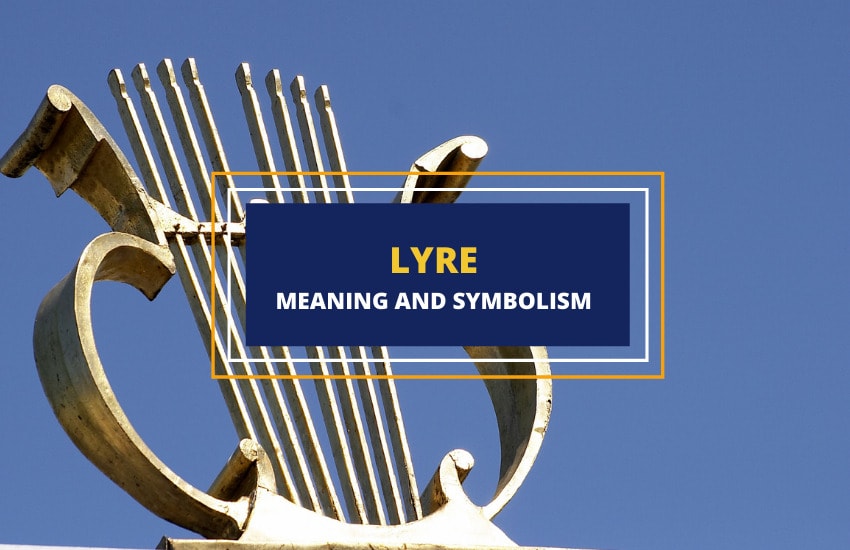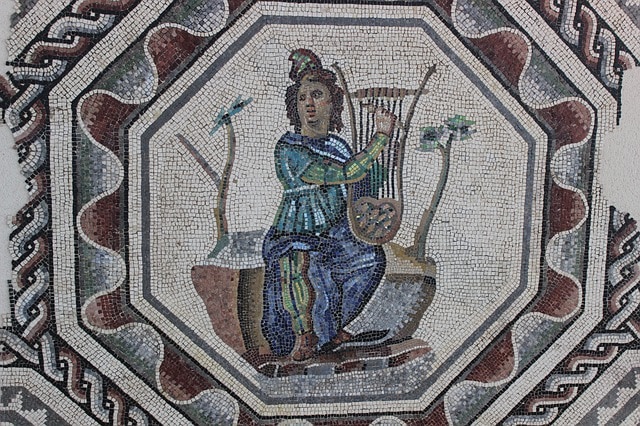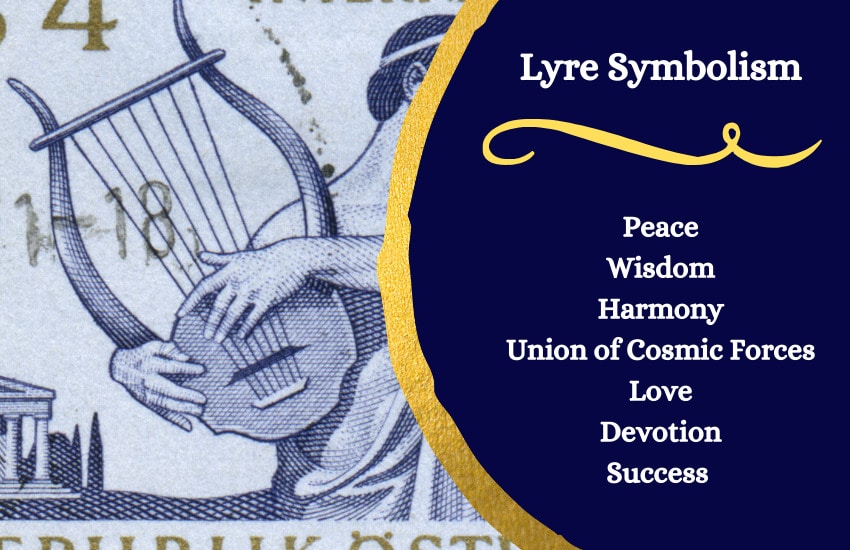
When someone talks about a lyre, what’s the first thing that comes to your mind? You probably imagine an ethereal angel playing a lyre or harp, creating soothing sounds that float through the gates of heaven. Books, TV shows, and movies portray angels this way, so people associating lyres with heavenly creatures is far from surprising.
But what exactly do lyres symbolize? Read on to learn more about the meaning of lyres before you start taking those music lessons.
Lyres in Ancient Greece
Ancient Greeks are known to have recited poetry while a lyre plays in the background. The Hagia Triada sarcophagus, which dates to about 1400 BC, features what’s considered the earliest picture of the said instrument. Unlike harps, classical lyres were played with a strumming motion rather than being plucked with fingers. One hand was used to keep some of the strings steady while the other was used to strum strings and produce certain notes, much like a guitar.
All references to classical lyres describe them as seven-stringed instruments that are plucked. Unlike a guitar, a classic lyre does not have a fingerboard for pressing down the strings. Greeks never played it with a bow as well, as it would not work with the instrument’s flat soundboard. Today, some types of lyres require bows to be played, although it is still most commonly played with one’s fingers or a pick.

The first version of lyres had hollow bodies, also known as resonators or soundboxes. In ancient Greece, the most common type of lyre was called a chelys. Its convex back was made of a turtle shell, with future versions made out of wood that was hollowed out to the shape of a shell.
Myth About the Creation of the Lyre
The Ancient Greeks told a legend that attempted to explain the origins of the lyre. Accordingly, the Greek deity Hermes once came across a tortoise and decided to use its shell as the soundbox of an instrument which people now know as the lyre.
There’s a lot more to this interesting Greek myth. It also talks about how Hermes got away with stealing cows from Apollo, one of the most important yet complex Greek deities. It is said that Hermes created the first lyre with a tortoiseshell, and was playing it, when Apollo confronted him, but forgot the offense in an instant. Apollo loved the sound so much that he even offered to trade his cattle for the lyre.
This fascinating story has led to conflicting accounts about who created the first lyre. Those who believe in the story above are adamant that Hermes created it, but others believe that Apollo himself created the very first lyre.
Types of Lyres

While lyres have continued to evolve over the years, two main types have maintained their popularity – box and bowl lyres. While the two look extremely similar, their components and the sound they produce make them easily distinguishable from the other.
Box lyres got their name from their box-like body and soundboard made of wood. They usually have hollow arms that resemble that of a Greek kithara. Bowl lyres, on the other hand, have a curved back and a rounded body. The former was immensely popular in the ancient Middle East, while the latter was a mainstay in ancient Greek culture. In Sumerian history, musicians were believed to have played gigantic lyres that were placed on the ground while being played with both hands.
Two other types of lyres dominated ancient Greece – lyra, which was of Syrian origin, and kithara, which was believed to be of Asiatic origin. While the way they’re supposed to be played is pretty much the same way, the number of their strings varied and reached as many as 12 at some point. Both are played while someone sings, but the lyra was considered an instrument for beginners while the kithara was suitable for professionals.
Lyre Symbolism

The lyre may symbolize many things – from wisdom to success to harmony and peace. Here are some of the most popular meanings that are commonly associated with lyres.
- Wisdom – Since lyres are commonly associated with Apollo, the god of music and prophecy, they have become symbols of moderation and wisdom to ancient Greeks. This strong association between Apollo and lyres stems from various myths that demonstrate his love for music. After his encounter with Hermes, Apollo went on to delight Zeus, the god of sky and thunder, with tunes that he played with his golden lyre.
- Harmony – Lyres are also believed to symbolize cosmic harmony. Apollo always carried his lyre with him, and it’s not just because he had the talent for it. Like in the story of how Hermes offered a lyre as a peace offering to him, this instrument became a powerful instrument of heavenly peace and social order. In addition, it’s possible that the calming sounds it produces automatically remind people of peaceful times.
- Union of Cosmic Forces – The lyre is also believed to symbolize the peaceful union between various cosmic forces. Since it usually has seven strings, each string was believed to symbolize one of the seven planets in our galaxy. Eventually, Timotheus of Miletus, a Greek musician and poet, added more strings to make it twelve, each corresponding to a certain Zodiac sign.
- Love and Devotion – According to some interpretations, dreaming of yourself playing the lyre might mean that someone is about to fall head over heels for you. That person will give you their undivided attention so be prepared to be showered with their love and care. So, if you’ve been looking for love and you’re starting to become desperate, seeing a lyre in your dream could be the next best thing.
- Success and Prosperity – Are you running a business? If you dream of listening to a melody coming from a lyre, you’re in for some good news. It is considered a symbol of success so expect your business to run smoothly. However, if you don’t have a business but you’re thinking of starting one, it might be your subconscious nudging you to take that risk you’ve been so afraid of.
Learning to Play the Lyre
If the timeless beauty and ethereal sounds of a lyre have piqued your interest, you’re probably wondering how you can start learning it. Here are some of the first steps:
- Your strings and the pick – The first step to learning to play is to become familiar with the lyre’s seven strings. It’s recommended to learn how each string corresponds to a music stave and get to know the proper way of holding a lyre. You’ll also need to understand how to tune your lyre. No matter how good you get at playing, your music wouldn’t play nice if you don’t know how to tune your lyre properly.
- Playing with your hands – Once you get a good grasp of the basics, you can proceed to learning how to play with your right hand and then your left hand. This is a prerequisite for finding your rhythm as you play the lyre. Once you’ve mastered plucking with your left and right hand, you can start learning how to play a song with both hands as well.
- Learning basic melodies – Now that you’ve covered the basics, you can start playing some ancient melodies. As you get better, you’d eventually be able to make some improvisations, adding your personal touch to the new songs you’ve learned to play.
Wrapping Up
Whether you’re looking for an instrument that you’d like to learn or you’re simply wondering what dreaming of a lyre means, you’ll definitely appreciate all the good things associated with this instrument. Lyres have withstood the test of time, maintaining their reputation as excellent instruments for expressing one’s artistic sensibilities – be it through poetry or music.








